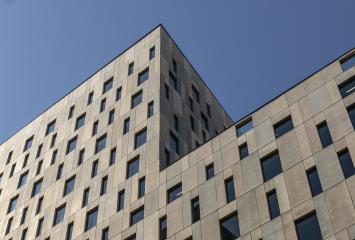The Influence of Natural Lighting on Well-being and Productivity
The current trend in office building construction regarding lighting is clear: there is a significant prioritization of harnessing sunlight over the use of artificial lighting sources. Behind this phenomenon lies the increase in social awareness regarding the need for human activities to be environmentally sustainable. Mechanisms that save natural resources and prevent pollution are welcomed. However, another reason justifying this trend is the positive impact of natural lighting on the well-being and productivity of workers.
Regulation of the Circadian Rhythm
Humans have evolved over hundreds of thousands of years to adapt to specific living conditions, including the simple concept of being active during the day and resting at night. The body's internal processes largely depend on the level of exposure to natural light, known as the circadian rhythm. Natural lighting helps keep the body and mind in optimal condition, while artificial light can disrupt this rhythm, causing sluggishness during times when one should be active.
Enhancement of Cognitive Abilities
Given that exposure to natural light triggers physiological events that prepare people for activity, and all human activity is, in a sense, cognitive, it is evident that such exposure stimulates workers' intellectual abilities, including attention, concentration, memory, analysis, and creativity. This is not mere speculation; a 2019 study by a team of scientists from the Polytechnic University of Madrid confirmed the relationship between natural lighting and performance. According to the study's paper, "it can increase employee productivity by more than 60%."
A Boost to Mood
The proper functioning of the circadian rhythm alone provides a boost to mood, as workers do not feel sluggish. Additionally, the activation of cognitive abilities allows them to enjoy their work more, be more effective, and thereby increase their self-esteem. Moreover, the influence of natural light on mood has not only indirect effects but also a more direct one: exposure to sunlight increases the release of serotonin in the brain, a neurotransmitter that contributes to peace and well-being, crucial in preventing psychological disorders such as stress, anxiety, or depression.
Promotion of Social Interaction
Well-lit open spaces promote social interaction. A few decades ago, under the traditional office model of the 21st century, free connection and communication among organizational employees were undesirable. The more isolated, the better. Today, companies are more aware than ever of the benefits of this synergy for both the individual well-being of their workers, a key factor in talent retention, and for their overall success. Furthermore, exposure to natural lighting also increases energy and vitality levels, impacting both the inclination for socialization and purely work-related motivation.
Other Benefits of Natural Light
Human eyes are designed for exposure to natural light rather than bulb lights. In this regard, prioritizing natural light by companies contributes to reducing visual fatigue among their workers. This, once again, positively influences individual comfort and productivity. Comfort benefits everyone. Additionally, natural light brings a more intense feeling of connection with nature, enhances the beauty of the working environment, and provides ethical tranquility for those committed to the planet's health. As we approach 2024, an office not centered around solar radiation is no longer comprehensible.

